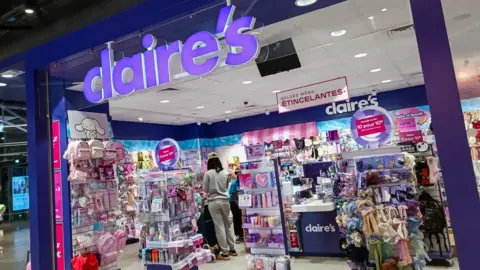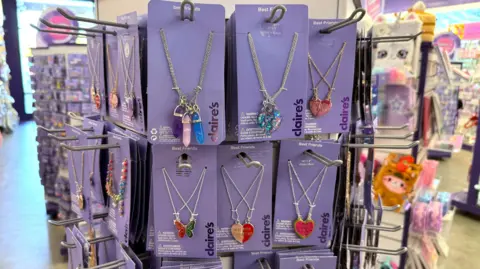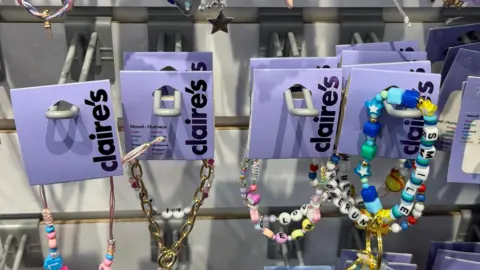BBC Business reporter
 AFP via Getty Images
AFP via Getty ImagesFashion accessories chain Claire’s has filed for bankruptcy in the US for the second time as it struggles with fewer people buying its products, and from online competition eating into profits.
It confirmed it had already been in discussions “with other partners” about its future. The BBC understands there will be no immediate impact on the firm’s UK stores.
The US-based firm said it was in discussion “with our vendors and landlords” about its North American stores, but shops there would remain open while it explored “alternatives”.
The US-based firm first filed for bankruptcy in 2018. It currently operates 2,750 stores in 17 countries throughout North America and Europe.
 Getty Images
Getty ImagesIt has about 280 stores in the UK, down from 370 in 2018 when it filed for bankruptcy because it was unable to repay a loan.
Claire’s is known for selling jewellery, colourful accessories such as necklaces and bracelets, and is part of millions of young people’s memories for its ear piercing services.
The firm operates under two brand names, Claire’s and Icing, and is the latest casualty of consumers shifting away from physical stores.
Claire’s is owned by a group of firms, including investment giant Elliott Management.
 Getty Images
Getty Images“This decision is difficult,” wrote Claire’s chief executive Chris Cramer, “but a necessary one”.
He blamed “increased competition, consumer spending trends and the ongoing shift away from brick-and-mortar retail” for the declaration of bankruptcy, as well as “debt obligations” and wider economic turmoil.
The firm’s global supply chain means it is likely to suffer as a result of tariffs imposed on goods, part of US President Trump’s escalating trade war with several countries, including China and Canada.
The company has a $500m (£375m) loan due in December next year, said Julie Palmer, partner at Begbies Traynor, which would be “looming heavily over management’s minds”.
Tariffs “have added to the strain”, she said.
According to retail analyst Catherine Shuttleworth, it is “fair to assume they’re exposed to the same pressures many accessories retailers are.
“A lot of that category is sourced from Asia, and any increase in import costs hits hard when your price points are low and margins are tight,” she added.
Mr Cramer said the firm remained in active discussions with potential “strategic and financial partners”, which did not exclude the possibility that it was still looking for a buyer.
‘Cheap to super-cheap’
The Claire’s bankruptcy was a “clear signal” that some parts of retail across the world were “failing to keep up with how people want to shop right now”, said Ms Shuttleworth.
She said young people didn’t just browse on the High Street for cheap accessories like they used to, with online competitors such as Shein targeting young shoppers with “super cheap” accessories.
Younger people were now “far more likely” to discover new brands through TikTok than in a shopping centre – and with footfall still well below pre-Covid levels, it had hit Claire’s very hard.
Ms Palmer said Claire’s “reliance on physical stores – once a key strength – has become a major liability”.
Outside of its European and American stores, Claire’s says it has a further 300 franchised stores located primarily in the Middle East and South Africa. It also sells its products in thousands of concessions stores in Europe and the US.
Its lavender-hued storefronts attracted young people particularly in the 1990s and early 2000s, who rifled through its neon and glitter accessories racks for good-value buys. It was often a usual stop for a Saturday shopping trip by families and tweens at malls across the world.
It also occasionally makes a foray into selling toys including slime, headphones or fluffy toys.
Source link
 Unews World
Unews World

